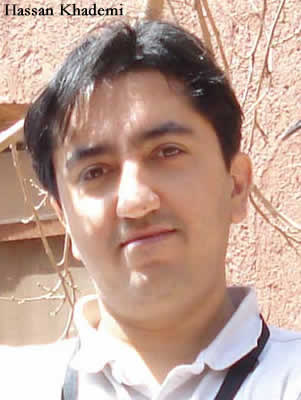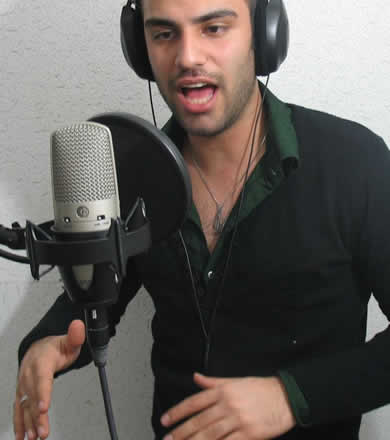 Hassan Khademi , the Iranian director of Rapping in Tehran, is a graduate with MA of Arts from University of Tehran and has conducted several research projects about Iranian underground music.
Hassan Khademi , the Iranian director of Rapping in Tehran, is a graduate with MA of Arts from University of Tehran and has conducted several research projects about Iranian underground music.
Hassan khademi’s short film, Rapping in Tehran, has participated in several international film festivals such as International Leipzig Festival for Documentary and Animated Film, Copenhagen International Documentary Film Festival and Peace on Earth Film Festival-Chicago.
Cinema Without Borders: How did you come up with the idea of Rapping in Tehran?
Hassan Khademi: I am a social researcher and I have conducted research in the field of Iranian youths and also young subcultures in Iran and I’ve written some papers about them. During my research, I found that Persian rap is the most popular music style among young Iranians. I should say that Persian rap is something more than a music genre; it is a social phenomenon.
CWB: How challenging was it to shoot this film? Did you face any problems and limitations?
HK: Since underground music is illegal in Iran and underground singers, mostly Persian rappers, sometimes may face legal repercussions, these groups are not easily accessible and it is actually very difficult to find them. It took me 5 months until I could convince them to take part in my film.
CWB: Did you know all the bands and performers beforehand, or you did you get to know them over the shooting period?
HK: Before the shooting period, I had studied about all the important Persian rappers and I had listened to most of their works. During creation of the film I got to meet with them and made friendships which still last to this day.
CWB: How did you manage gain the trust of the artists performing in Rapping in Tehran?
HK: It was such a difficult job! The artists were particular in how they were filmed because they all feared of getting identified by the police, which would be troublesome for them. We tried to accommodate all of their requests to ensure their safety and peace of mind.
CWB: Did you have a visual style in mind when you started “Rapping in Tehran”, or would you say that your vision came through in post-production?
HK: I had a screenplay before shooting. But, like most documentary films, the events which happened during shooting changed the story of the film. For example, my film ends with the unwanted exile of some of the pioneering Persian rappers while, at the beginning, I hadn’t prospected this event. I can say my film was produced during the editing process.
CWB: Were there any of the artists that did now allow you to have them in Rapping in Tehran and were there any scenes that you liked that you had to remove from the final-cut?
HK: In this film, I went to the most talented Persian rappers, and the most important ones were ready to cooperate with me. A couple of them said they would only participate if I agreed to exclude other rappers because of their competition; a condition that I didn’t accept.
In terms of film scenes, I should say I loved some of them but I had to omit them because they didn’t correlate with the main story or they would create trouble for the rappers.
CWB: How did the artists react after seeing Rapping in Tehran?
HK: The musicians who have watched the film are very pleased. They are happy to be portrayed in a positive light and they enjoy how they are represented.
CWB: What is the current state of Iranian underground music and how do you see its future?
HK: Underground music is the most popular music genre amongst Iranian youths. My recent survey, which I conducted for a government organization in Iran, has confirmed my research results and also  verified my understanding about underground Persian rap during the shooting period.
verified my understanding about underground Persian rap during the shooting period.
It is difficult to foresee the future of this genre, but it is obvious for me that Persian rap in Iran is not the cause, but it is the effect. It doesn’t matter if the effect is Persian rap or anything else, as long as the cause is still there.
CWB: Are you working on any new projects?
HK: Yes. I am in the research period of a film about Iranian clergies.
CWB: How can interested individuals watch Rapping in Tehran?
HK: Although my film cannot get permission to be shown in Iran, I have shown it in private gatherings with students, teachers and other Iranian elites—even to some cultural policy makers of the Iranian government.

